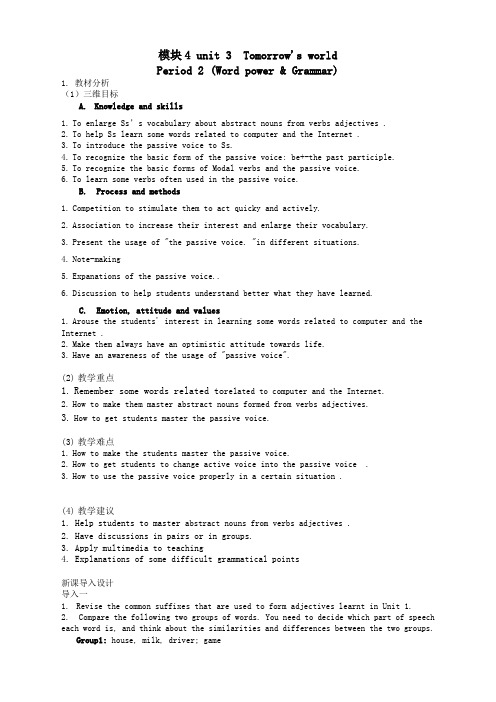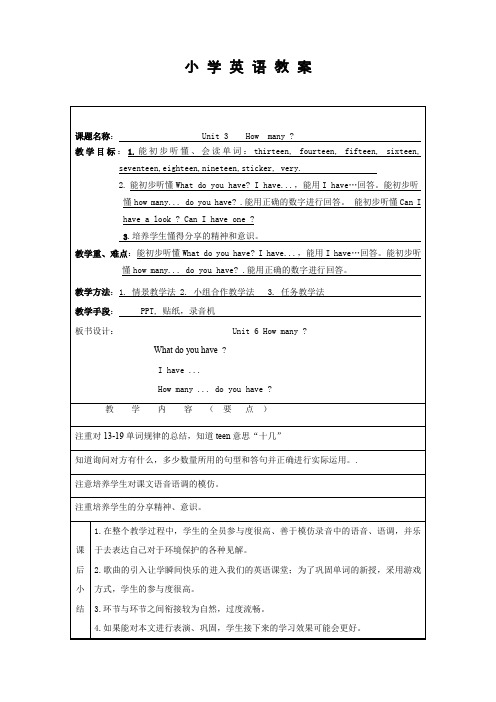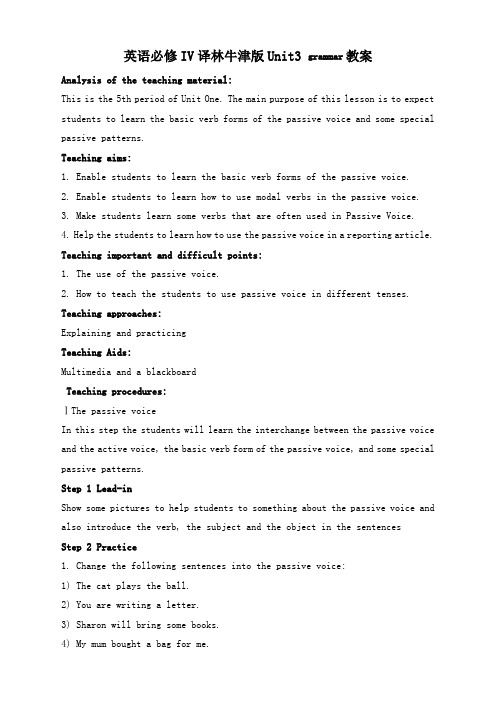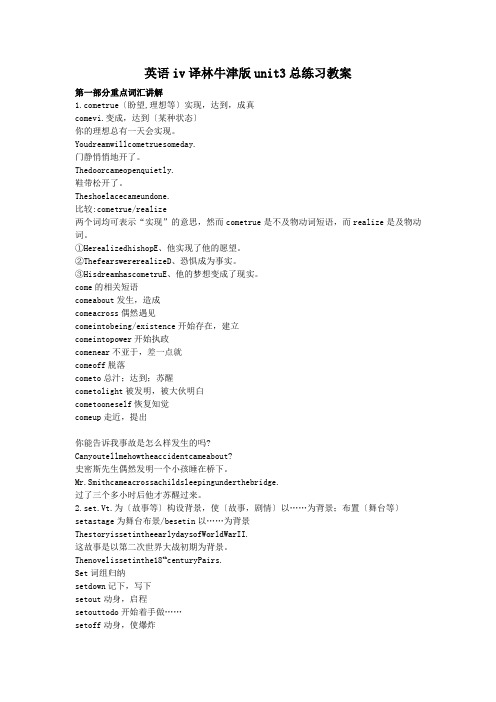英语ⅳ牛津译林版unit3教案
- 格式:doc
- 大小:28.00 KB
- 文档页数:2

模块4 unit 3 Tomorrow's worldPeriod 2 (Word power & Grammar)1. 教材分析(1)三维目标A. Knowledge and skills1.To enlarge Ss’s vocabulary about abstract nouns from verbs adjectives .2.To help Ss learn some words related to computer and the Internet .3.To introduce the passive voice to Ss.4.To recognize the basic form of the passive voice: be+-the past participle.5.To recognize the basic forms of Modal verbs and the passive voice.6.To learn some verbs often used in the passive voice.B. Process and methodspetition to stimulate them to act quicky and actively.2.Association to increase their interest and enlarge their vocabulary.3.Present the usage of "the passive voice. "in different situations.4.Note-making5.Expanations of the passive voice..6.Discussion to help students understand better what they have learned.C. Emotion, attitude and values1.Arouse the students' interest in learning some words related to computer and the Internet .2.Make them always have an optimistic attitude towards life.3.Have an awareness of the usage of "passive voice".(2)教学重点1.Remember some words related to related to computer and the Internet.2.How to make them master abstract nouns formed from verbs adjectives.3.How to get students master the passive voice.(3)教学难点1.How to make the students master the passive voice.2.How to get students to change active voice into the passive voice .3.How to use the passive voice properly in a certain situation .(4)教学建议1. Help students to master abstract nouns from verbs adjectives.2. Have discussions in pairs or in groups.3. Apply multimedia to teaching4. Explanations of some difficult grammatical points新课导入设计导入一1.Revise the common suffixes that are used to form adjectives learnt in Unit 1.pare the following two groups of words. You need to decide which part of speech each word is, and think about the similarities and differences between the two groups.Group1: house, milk, driver; gameGroup2: revision, preparation, decision, difference, information,All the words are nouns, but words in Group1 refer to physical things and those in Group2 refer to ideas, actions, and qualities. The nouns in Group2 are called abstract nouns, and we always use them to say something we cannot see or touch directly.导入二Finish the sentences with the words in blanket.1.Many wild animals have _______________ because people have destroyed their livingenvironment. We have to take some actions to prevent the ___________ of wild animals.(disappearance; disappear)2.The new motorway between the two cities has finally __________. It’s good bews forpeople who have to travel a lot there.The manager made a speech at the ________ceremony of the supermarket. (open; opening ) 3.Thanks to his ___________, we are all saved, and all of us think he is such a _______person. (kind; kindness)4.The man carried the boy to _______ as the train come over, and the boy was _______atlast. (safe, safety).。


英语必修IV译林牛津版Unit3 grammar教案Analysis of the teaching material:This is the 5th period of Unit One. The main purpose of this lesson is to expect students to learn the basic verb forms of the passive voice and some special passive patterns.Teaching aims:1. Enable students to learn the basic verb forms of the passive voice.2. Enable students to learn how to use modal verbs in the passive voice.3. Make students learn some verbs that are often used in Passive Voice.4. Help the students to learn how to use the passive voice in a reporting article. Teaching important and difficult points:1. The use of the passive voice.2. How to teach the students to use passive voice in different tenses. Teaching approaches:Explaining and practicingTeaching Aids:Multimedia and a blackboardTeaching procedures:ⅠThe passive voiceIn this step the students will learn the interchange between the passive voice and the active voice, the basic verb form of the passive voice, and some special passive patterns.Step 1 Lead-inShow some pictures to help students to something about the passive voice and also introduce the verb, the subject and the object in the sentencesStep 2 Practice1. Change the following sentences into the passive voice:1) The cat plays the ball.2) You are writing a letter.3) Sharon will bring some books.4) My mum bought a bag for me.5) Jane was doing her homework.6) We had painted some pictures before you came.7) I am going to water the flowers.8) He told me that they would hold the meeting the next day.2. Make a list of the passive voice in the different tenses by showing two pictures.3. Fill in the blanks to consolidate what they have learnt.1). I ___________ (give) a new book by my father on my birthday. was given2). English ___________ (find) very useful. is found3). The picture ______________ (finish) tomorrow. will be finished4). The bike ______________ (repair) by them now. is being repaired5). The building_________________ (build) this time last year. was being built6). How ______ the flags already _______________(make)? have been made7). The new railway ___________ (build) by the end of last year. had been built8). What_________________ (discuss) now? is being discussed9). Rice ___________ (grow) in the south of the States. is grown10). Jane said her friends_______________ (invite) to her birthday party the next week. would be invitedStep 3 Model verbs and the passive voice1. Introduce the model verbs in the passive voice by showing two sentences. And tell them the structure:modal verb +be done2. Fill in the blanks.1). Some viewers might not _____________ (impress) by the RealCine. be impressed2). Special gloves must_________ (wear). be worn3). A real sense of achievement and happiness may________ (feel). be felt 3. Do the exercise on Page50.ⅡExercise and summaryIn this period seven points have been showed. Make the summary by doing exercise first.Point 1He often tells us interesting storiesWe are often told interesting stories.Interesting stories are often told to us.When verbs like give, lend, offer, send, tell and show can be followed by two objects, in the passive voice we often use the person as the subject, and sometimes the thing is used .Point2I hear the girl sing English songs.The girl is heard to sing English songs.the active voice → make/see/hear sb do sththe passive voice→ sb be made/seen/heard to do sthPoint3This sweater_______ (wash) well. washesYour article_______ (read) well. readsThe pen________ (write) smoothly. writesThese verbs used in the active voice give a passive meaning.Point4Translate the sentences using get done.1.我的自行车昨晚被偷了。

2024年牛津译林4aunit3教案合集一、教学内容1. Chapter 1: Present Simple Tense(一般现在时)描述日常活动和习惯一般现在时的肯定句、否定句和疑问句2. Chapter 2: Adjectives(形容词)形容词的比较级和最高级形容词在句子中的使用二、教学目标1. 学生能够理解并运用一般现在时描述日常活动和习惯。
2. 学生能够正确使用形容词的比较级和最高级进行描述。
3. 学生能够在实际情境中运用所学语言知识进行交流。
三、教学难点与重点1. 教学难点:一般现在时和形容词比较级、最高级的运用。
2. 教学重点:日常活动和习惯的描述;形容词比较级和最高级的用法。
四、教具与学具准备1. 教具:PPT、黑板、实物、卡片等。
2. 学具:课本、练习本、彩笔等。
五、教学过程1. 导入:通过展示一幅描绘日常活动的图片,引导学生用一般现在时描述图片中的人物正在做什么。
2. 新课内容展示:a. 教师讲解一般现在时的用法,并举例说明。
b. 学生跟随教师朗读例句,并进行角色扮演。
c. 教师展示形容词比较级和最高级的用法,并让学生在句子中进行实际运用。
3. 随堂练习:学生完成教材中的练习题,巩固所学知识。
4. 小组活动:学生分组,用一般现在时和形容词比较级、最高级描述组内成员的日常活动。
六、板书设计1. 一般现在时的肯定句、否定句和疑问句结构。
2. 形容词的比较级和最高级变化规则。
3. 课堂重点词汇和句子。
七、作业设计1. 作业题目:a. 用一般现在时描述自己的日常活动。
b. 用形容词比较级和最高级描述家庭成员的外貌或性格特点。
答案:a. 例如:I get up at 6:00 every morning. I go toschool bus.b. 例如:My mother is the tallest person in our family. She is kinder than my father.八、课后反思及拓展延伸1. 课后反思:本节课学生对于一般现在时和形容词比较级、最高级的掌握情况较好,但仍有个别学生需要加强练习。

英语iv译林牛津版unit3总练习教案第一部分重点词汇讲解etrue〔盼望,理想等〕实现,达到,成真comevi.变成,达到〔某种状态〕你的理想总有一天会实现。
Youdreamwillcometruesomeday.门静悄悄地开了。
Thedoorcameopenquietly.鞋带松开了。
Theshoelacecameundone.比较:cometrue/realize两个词均可表示“实现”的意思,然而cometrue是不及物动词短语,而realize是及物动词。
①HerealizedhishopE、他实现了他的愿望。
②ThefearswererealizeD、恐惧成为事实。
③HisdreamhascometruE、他的梦想变成了现实。
come的相关短语comeabout发生,造成comeacross偶然遇见comeintobeing/existence开始存在,建立comeintopower开始执政comenear不亚于,差一点就comeoff脱落cometo总汁;达到;苏醒cometolight被发明,被大伙明白cometooneself恢复知觉comeup走近,提出你能告诉我事故是怎么样发生的吗?Canyoutellmehowtheaccidentcameabout?史密斯先生偶然发明一个小孩睡在桥下。
Mr.Smithcameacrossachildsleepingunderthebridge.过了三个多小时后他才苏醒过来。
2.set.Vt.为〔故事等〕构设背景,使〔故事,剧情〕以……为背景;布置〔舞台等〕setastage为舞台布景/besetin以……为背景ThestoryissetintheearlydaysofWorldWarII.这故事是以第二次世界大战初期为背景。
Thenovelissetinthe18th centuryPairs.Set词组归纳setdown记下,写下setout动身,启程setouttodo开始着手做……setoff动身,使爆炸setaside留出,不顾,取消,驳回setfootin/in踏进/踏上setfiretosth把……点燃setagoodexampletosb为……树立好榜样setthetable摆桌子3.uponprep、在……后马上,一……就……,on以代替uponUponreachingthehotel,shee—mailedherfather.她一到旅馆就给她父亲发了电子邮件:。

译林版四年级英语上册unit3教案译林版四年级英语上册unit3教案1教学内容:Look and read Play a game教学目标:1. 知识目标:Using possessive adjectives to show possession Using nouns phrasesto identify people,animals,events,objects and activities Asking simple questionsto obtain yes/no answers2. 能力目标:Communicate with teachers or other learners3. 情态目标:爱护绿化重点难点:Its stalk is long. Has it got …?Teaching aids:pictures,recorder教学过程:一Warming –up1,Sing a song2,Daily talkRevision Review:stalk,leaves,flowers,roots,二Presentation1.Show a picture of a plant with flowers. Ask:What is it?Is it a tree? Toelicit:a plant/ Ask:What colour are the flowers? What colour are theleaves? Toelicit:They?re… Ask:Are they long or short? To elicit:They?relong(short) .2.Draw another plants. Say:Look at this plant.Its flowers are red. Look atthat plant .Its flowers are purple.3.Listen to the tape.4.Say sth.about the plant .Show a picture of a tree. Introduce:a trunk,branches.Make sentences:Its trunk is big. It branches are long.Listeen to the tape.Say sth about the tree.Play the cassette:Play a game/ Listen and repeat.Play this game.三Consolidation1.Photocopiable pages 44-45.2.Workbook page 29.3.Grammar practice book 4a page 35.板书设计:Unit 2 Look at,,, Its stalk is…Its trunk is…leaves are …branches… roots flowers译林版四年级英语上册unit3教案2教学内容:Look and write教学目标:1. 知识目标:学习用动词来描述动作2. 能力目标:运用标志来发命令3. 情感目标:培养学生遵守纪律的习惯重点难点:Using imperatives to express prohibitions教学准备:tape, radio, some picture cards教学过程:一Warming-up1. Daily talk2. Act out the dialogue二Revision1. Some phrases: in the pond on the river under the tree2. Some drills: Where is the fountain? It’s near the tree. Where are thebirds? They’re in the aviary.3. Ask and answer: Where is the…? It’s in the…三Presentation1. Teaching the sign “ close the door” Open the door of the classroom, thendraw a sign: Close the door on the board. Say and write: Close the door. Promptan individual student to close the door. Introduce: a sign Show some signs tothe students2. Draw other signs in Look and read on one side of the board. Don’t feedthe birds. Don’t pick the flowers. Don’t climb the trees. Don’t walk on thegrass. Don’t play in the pond.Read these signsLook and sayGuessing game3. Draw a park scene on the board, then practice the signsTalk about the parkAsk students to copy the signs you have drawn on the board and put them inthe right places in the park.Encourage the students to include other signs that they might find in thepark.四Consolidation1. Listen and repeat2. Have the students work in pairs to write the numbers of the signs in theappropriate red circles.3. Distribute a copy of photocopiable page 36 to each student.Find the correct signs.译林版四年级英语上册unit3教案3教学目标:1.能听懂会说会读交际用语:Welcome to … What are these/those?They’re …Are these/those…? Yes, they are./No, they aren’t2.能听懂会说会读词汇:they’re=they are, pig, cow, chicken, duck3.能听懂会说会读会写词汇:farm, they, pig, apple, those4.能熟练朗读对话或表演对话。
英语iv译林牛津版unit3wordpower教案1. Analysis of the teaching material:This is the 4th period of Unit One. The main purpose of this period is to learn to form abstract nouns from verbs and adjectives by adding suffixes and know some words related to computers and to apply them practically.2. Teaching aims:1) To learn how to form abstract nouns from verbs and adjectives by adding suffixes.2) To know some words related to computers and to apply them practically. Teaching important and difficult points:1) How to make students master the rules of forming abstract nouns from verbs and adjectives.2) Make students expand related vocabulary and apply them practically. Teaching approaches:1) Explanation method to make students master the rules of forming abstract nouns from verbs and adjectives.2) Description method to make students to master some words related to computers.3) Exercise method to consolidate what have learnt in class. Teaching Aids: multimedia and a blackboardTeaching procedures:Step 1Brainstorming1) Enjoy a passage:whenhe sawthegrowingpopularityoftheInternet.Duringthefirstfewyears,thecompanydidnotmakeaprofitandMr.Bezosthoughtt hathiseffortswouldendinfailure.However,Internetconnectionbecamefaster andalotofimprovementsweremadetohomecomputers. Wordslikedevelopment,popularity,failure,connectionandimprovementthatr eferstoanidea,anaction,ageneralqualityorsomethingthatcannotseeortouch directlyarecalledabstractnouns.Mostabstractnounsareuncountable.Onlyafewofthemarecountable,e.g.ahope, anidea,andasituation.2)Askthemtothinkaboutmoreabstractnouns.illness,dependence,performance,admiration,training…Step2Formingabstractnounsfromverbsandadjectives1.Wecanformabstractnounsfromsomeverbsandadjectivesbyaddingsuffixes.Tips:1)Sometimesweneedtochangethefinallettersofawordbeforeaddingsuffix: produce→productionsilent→silencedecide→decisionpretty→prettinessplease→pleasure2)Mostabstractnounsareuncountable,onlyafewofthemarecountable:hope→ahope;idea→aidea;situation→asituationyouth(青春)→ayouth〔青年人〕;power〔电力〕→apower〔大国〕;beauty〔漂亮〕→abeauty〔美人,美的东西〕DotheexerciseonPage462.Readaboutthehistoryoftheworld’ethepluralformstofillintheblanks. Answers:1)development2)popularity3)failure4)connection5)improvements6)present ation7)achievement8)admirationStep3Wordsrelatedtocomputers1Revisenamesofsomepartsofthecomputer.(screen,monitor,speaker,keyboard,mouse,CD-Rom,printer)2TeachSstolearnmorewordsrelatedtocomputers,especiallythemostup-to-dat ehardware:(harddrive,floppydisk,floppydiskdrive,U-Disk,ROM,RAM,CPU) 3TeachSstounderstandthefunctionsofdifferentpartsofacomputer.scanner扫描器soundcard声卡Hyperlink超链接networkcardcursor光标click点击Step5Homework1.Revisewhatwehavelearntinthispart.2.Trytofindmoreinformationaboutcomputerscience.3.PreviewGrammarandusage。
Unit 3 Tomorrow' s world reading 2 教学设计Lead-inT: From the text ,we know that Real Cine uses new technology to improve an existing type of entertainment. Could this technology be used in some other ways?Now,work in pairs and discuss with your partners. Five minutes later,I will collect your answer.S1: I think it should be used to meet people all over the world. We have friends in many other places. Since we are busy studying at school,we don’t have much time to communicate with our friends. If we can use this technology,we can communicate with our friends more often.S2: I think it should be used to train drivers. As we know,private cars are becoming more and more popular among common people. To have access to driving cars,we should first get the driving license. For example,my dad has to go to the driving school once a week . But he is so busy that sometimes he couldn’t take the classes. If the virtual reality can be used in our home,we needn’t spend the valuable time going to the driving school. We just learn the skill at home. T: Good idea!Thank you!You are really imaginative. I hope one day your dreams will come true. I know that you have understood the reading passage thoroughly. That’s all for our reading part.Language points1、With the rapid development of science and technology,some of our wildest dreams could come true in the future.(on page 41 )come true:实现,到达,成真come vi. 变成,到达(某种状态)e.g. 1、你的理想总有一天会实现. You dream will come true someday.2、门静悄悄地开了. The door came open quietly.3、鞋带松开了. The shoelace came undone.come true/realize:均可表示“实现〞的意思,但是come true是不及物动词短语,realize是及物动词。
高中译林牛津英语模块四Unit3教案Module4, Unit3 单元教课方案课题项目话题语言知识语言技术感情态度学习策略文化意识AWE M4U3主备人胡黎莉目标要求Tomorrow ’ s world语音Natural and fluent pronunciation and intonationReality,presentation, amaze, passive,user, sightseeing, happiness, network,studio,social, confident, disappointed,disabled, convenience, secure, injure,biology, urban, planning, neighbourhoood, operator, fee, disadvantage, electric,词汇liquid,powder, programming, accuse, privacy,fade, editor, constant, monitor,function, monitor, function, button, chief, importance, pack, nephew, hire, shore,mushroom, gas, exit, ceiling, float, escape, terror, upwards, sunlight, zip, worn,mankind, beast, impression, master, frostAdd to, put forward, with the aid of, carry out, as to, last but not least1.The passive voice语法 2.Modal verbs and passive voice3.Verbs often used in the passive voice1. Describing popular science and modern technology功能2.Describing school environmentsBy the end of the unit, students will be able to听listen for facts and opinions and to an interview about computer use说discuss views on technology and interview a classmate about computer use读read a business presentation and summaries of two science fiction novels写Write a proposal for a computer room and a short science fiction storyStudents know and accept diverse cultures and broaden horizon.Students learn how to be cooperative as well as competitive with others.Summarize what is in listening and reading;put more effort on the difficulties; cooperate with other;expand knowledge in other ways1.Scientific and technological developments2.Famous science fiction writers and their science fiction stories注:目标要求可参阅南京外国语学校仙林分校《英语教课实行纲领》第四部分“目标内容”中的相关描述。
译林版四年级英语上册unit3教案一、教学内容本课教学内容选自译林版四年级英语上册Unit 3,主要讲述了关于动物的知识。
教材内容包括:课本第3页的词汇表,介绍了一些常见的动物名称;第4页的对话,讲述了两个小朋友在动物园的见闻;第5页的单词卡片,展示了各种动物的图片及英文名称;第6页的练习题,巩固所学动物名称及句型。
二、教学目标1. 学生能够掌握本课的单词和句型,正确运用所学知识进行日常交流。
2. 学生能够听懂、会说、会读本课的生词和句型,提高英语口语表达能力。
3. 培养学生的观察能力、合作能力和思维能力,提高他们对动物的认知。
三、教学难点与重点重点:单词和句型的学习,能够听懂、会说、会读本课的生词和句型。
难点:动物名称的准确记忆和运用,以及句型的灵活运用。
四、教具与学具准备教具:多媒体课件、动物图片、单词卡片、录音机、磁带。
学具:课本、练习册、铅笔、橡皮。
五、教学过程1. 热身(5分钟)教师与学生用英语进行简单的交流,询问学生昨天做了什么,引导学生用英语回答。
然后播放一首关于动物的歌曲,让学生跟随音乐节奏进行演唱,活跃课堂气氛。
2. 引入(10分钟)教师向学生展示一些动物的图片,引导学生用英语说出这些动物的名称。
然后告诉学生今天要学习关于动物的新的单词和句型。
3. 呈现(10分钟)教师通过课本第3页的词汇表,呈现本课的生词,并用生动的语言描述这些动物的特点。
然后让学生跟读这些单词,确保学生能够正确发音。
4. 操练(10分钟)教师组织学生进行小组活动,让学生用英语互相介绍自己喜欢的动物,并练习本课的句型。
然后邀请一些学生到讲台前,用英语介绍自己喜欢的动物,其他学生进行听力练习。
5. 巩固(10分钟)教师通过课本第6页的练习题,检查学生对本课单词和句型的掌握情况。
然后让学生进行小组竞赛,看哪个小组能够在最短的时间内完成练习题。
6. 拓展(5分钟)教师引导学生思考:除了课本上提到的动物,还有哪些动物是我们没有提到的?让学生用英语进行讨论,并展示他们的研究成果。